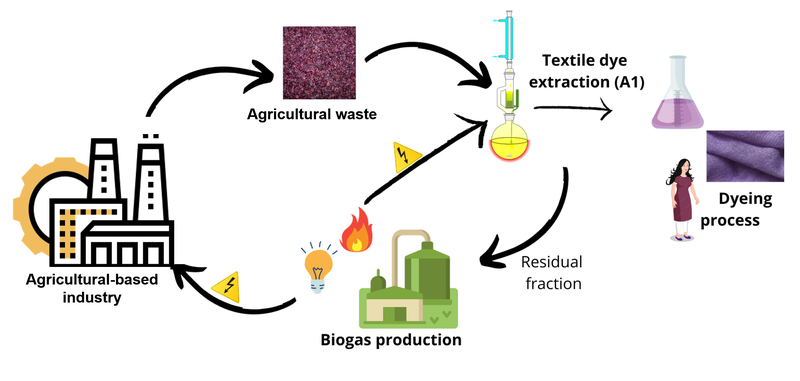Boosting bioeconomy through different agroindustrial wastes valorisation into sustainable textile dyeing followed by bioenergy recovery MKT2024/0191_E
The objective is obtaining a valuable resource and bioenergy from local agroindustrial wastes (e.g. grape and olive pomace) by first, obtaining a natural dye for textile dyeing processes and, then obtaining biogas through anaerobic digestion. Ref. MKT2024/0191_E
Boosting bioeconomy through different agroindustrial wastes valorisation into sustainable textile dyeing followed by bioenergy recovery MKT2024/0191_E
The objective is obtaining a valuable resource and bioenergy from local agroindustrial wastes (e.g. grape and olive pomace) by first, obtaining a natural dye for textile dyeing processes and, then obtaining biogas through anaerobic digestion. Ref: MKT2024/0191_E
El repte/The challenge
The bioeconomy is crucial for sustainability within the EU’s Green Pact, promoting bioproducts and bioenergy over fossil fuels. Circular economy practices in regional agroindustrial sectors enhance local development and resilience by valorizing agricultural wastes.
The textile industry, especially dyeing, is highly polluting due to water use and wastewater generation. Synthetic dyes, derived from petroleum, are widely used but hard to eliminate and resistant to chemicals. Investigating low-cost, effective alternatives like natural dyes is essential.
No technological or economic deficits have been detected, proving the process’s industrial viability. A significant social/cultural deficit is the lack of knowledge about bio-based textile dyes. Additionally, residual biomass from dye extraction should be converted into biogas and biosolids through anaerobic digestion, creating a sustainable biorefinery process. A techno-economic assessment will validate the process feasibility on an industrial scale.
La tecnologia/The technology
The technology is based on several simple steps:
- Collection of agricultural waste
- Extraction of the coloring fraction from the agricultural waste by simple methodologies
- Use of the extracted coloring fraction as a dye for textile substrates by exhaustion methods
Avantatges innovadores/Innovative advantages
Agricultural waste management involves the production of various by-products. Some companies already valorize those wastes into fuel or animal feeding. But, up to date there is no industrial valorization of that wastes into textile dyes. For this reason, is pretended to increase the diversity of wastes’ applications, mainly the ones generated in local industries and, to implement a new range of natural dyes and generate bioenergy.
By valorizing waste and using it for energy generation, it allows for closing the recycling loop and enables the implementation of sustainable technologies in local agricultural sectors.
Dye extraction process can be held by technologies that can be easily implemented and found in the market. No industrial competitors have been identified but yes potential industries interested and the technology has been demonstrated at industrial level.
Fase actual de desenvolupament/Current stage of development
The technological process has been proven to be successful at an industrial level in a relevant industrial environment. Therefore, along with the fact that the technology utilizes equipment already available on the market, it makes it very appealing for easy implementation in the current marketplace.
Aplicacions i mercat objectiu/Applications and target market
The target market includes companies involved in various stages of the process, such as olive oil producers, wineries, and other agricultural industries, who can produce the dye. Suppliers of auxiliary textile products or external partners may distribute the dye and join the supply chain. Industrial textile dyers will use the dye extracted from agricultural wastes. Agricultural industries benefit by creating a new market niche, increasing turnover, and using remaining alperujo as biomass.

General procedure of the technology
Oportunitats de negoci/Business opportunity
Cerca de col·laboradors per avançar en el desenvolupament i implementació a mercat/Looking for collaborators to advance in the development and market implementation
Estat de la propietat intel·lectual i industrial/Intelectual property status
Altres formes de protecció/Other forms of protection
Contacte/Contact
Servei de Gestió de la Innovació
T. +34 934 13 76 23
gestio.innovacio@upc.edu